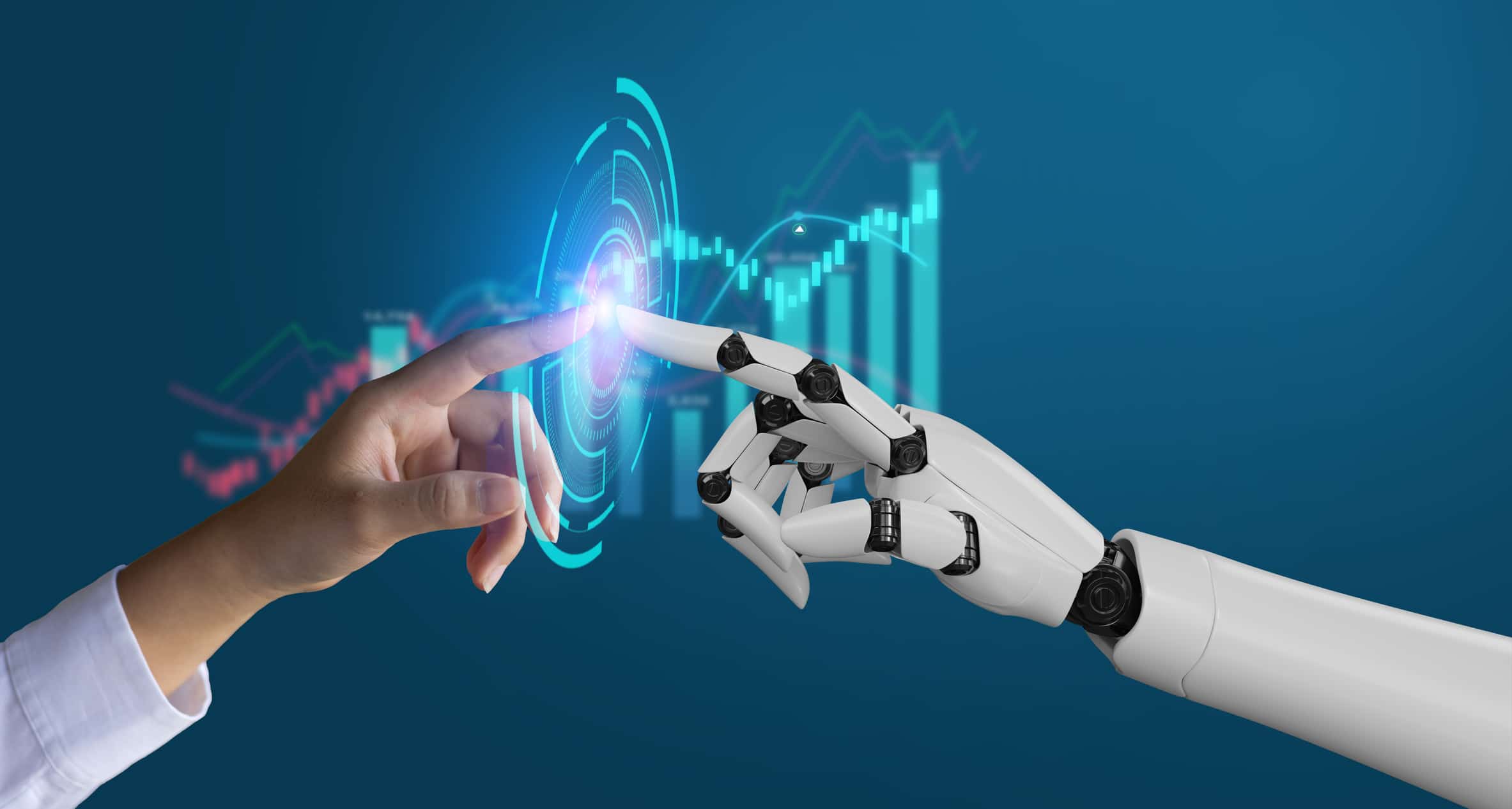)
We might make money when you click on links to our partners. Discover more.
What is synthetic general intelligence (AGI), and why does it matter? As one of the most talked-about subjects in innovation today, it has stimulated a race among leading companies like OpenAI and Google to turn this advanced concept into reality. Understanding AGI is necessary due to the fact that it has the possible to revamp industries, impact our society in extensive ways, and alter the method we connect with technology. Here's what you need to know about what it might be able to do, how it might transform industries and fields, and the significant difficulties facing its development.

KEY TAKEAWAYS
• AGI varies from standard AI in key methods in that it would have the ability to believe, find out by itself, and adjust to brand-new difficulties like people unlike conventional AI, which is designed for specialized tasks and operates within a limited scope. It needs humans to update and improve capabilities. (Jump to Section).
• Once it becomes a truth, AGI would be able to make amazing advances in numerous fields, consisting of health care, research study, and finance sectors. (Jump to Section).
• Creating AGI is difficult due to the research challenges that include technical, ethical, and societal issues. Addressing these difficulties is central to preserving the safe and favorable advancement of this innovation. (Jump to Section)
Featured Partners: Artificial Intelligence Software
Learn More
TABULATION
What is Artificial General Intelligence (AGI): A Clear Definition.
Understanding AGI vs Traditional AI.
Potential Applications of Artificial General Intelligence.
Challenges in Artificial General Intelligence Research.
3 Introductory AGI Courses to Consider.
Frequently Asked Questions (FAQs).
Bottom Line: Why Knowing What Is Artificial General Intelligence Matters.
What is Artificial General Intelligence (AGI): A Clear Definition
Artificial basic intelligence, or AGI, describes a kind of synthetic intelligence (AI) that can analyze, discover, and carry out any cognitive task that a human can do. Unlike today's AI, which is built to handle specific tasks like suggesting products or processing data, AGI would be able to adjust to new challenges and apply knowledge throughout different fields. To put it simply, this innovative kind of AI would believe and reason like a human. While AGI holds excellent potential, it's worth noting that it is still an idea today, with no fully established systems available yet.
Key Capabilities of Artificial General Intelligence
AGI would have a variety of abilities that simulate human intellectual functions, so it can carry out tasks beyond the narrow focus of the present AI tools in the market. Some essential capabilities consist of the following:

Human-Like Reasoning: The innovation would have the ability to comprehend and make decisions the way humans do. It would believe seriously, resolve problems, and come up with options based on its own experiences and past interactions, similar to how we apply past knowledge to brand-new situations.
Solving Unfamiliar Problems: One of AGI's strengths is its potential to tackle brand-new issues. Unlike standard AI, which is trained to perform particular jobs, AGI would have the capacity to manage issues it hasn't been directly trained to fix. It might find out how to approach an entirely new obstacle, much like people do when confronted with something we have actually never encountered before.
Self-Learning and Adapting: AGI could fine-tune its abilities and learn from experience, without the need to be by hand upgraded each time. It would observe and evaluate information, find out from errors, and discover better ways to finish tasks gradually. This indicates AGI might adapt to new circumstances and get better at tasks on its own.
Using Knowledge Across Different Areas: AGI would be able to take what it discovers in one area and use it to other tasks. For instance, if it learned how to resolve mathematics problems, it could use that knowledge to attend to challenges in other fields, like science or service. The capability to transfer skills across various locations is something humans do naturally and would make the innovation versatile in varied sectors.
Understanding and Responding to Emotions: Recognizing and responding to human emotions would likewise be within AGI's capabilities. This would be very important in settings where understanding people's feelings matters, such as healthcare, customer support, or social circumstances. By reacting to feelings appropriately, AGI would be much better geared up to deal with people in an efficient way.
Understanding AGI vs Traditional AI
The table listed below provides a photo of the major differences in between AI and traditional or narrow AI by underscoring their capabilities, adaptability, and existing status.
AGI would have the ability to believe, find out autonomously, and adjust to brand-new challenges like human beings. However, it is still theoretical and has not been recognized yet. On the other hand, standard AI is developed for particular tasks and runs within a repaired scope. It can not adapt to brand-new tasks without human input.
For example, an AGI could learn to detect medical conditions, then utilize that knowledge to develop individualized treatment plans-and even change its approach based upon the patient's progress. Additionally, it might use this problem-solving capability to tasks in entirely different fields, such as producing business techniques or encouraging on ecological conservation. In contrast, traditional AI, like a diagnostic tool, can just evaluate medical data for specific conditions. It can not adjust to other areas or enhance on its own.
Potential Applications of Artificial General Intelligence
While AGI isn't here yet, its possible applications cover various fields and hold great pledge of extreme developments in numerous sectors. Without being restricted to particular jobs like narrow AI, AGI would be extremely flexible and could apply its capabilities to fix multi-disciplinary issues. It could get rid of challenges presently beyond the capabilities of existing AI applications.
Transforming Healthcare
AGI would alter the game in healthcare by identifying complex and rare illness with greater precision, even in cases where symptoms are ambiguous or overlap with several conditions. It could develop extremely customized treatment strategies by studying client history, hereditary details, and real-time health data. In addition, AGI might accelerate drug discovery, determining possible treatments in weeks instead of years by processing huge datasets and running predictive simulations.
Advancing Scientific Research
In clinical research study, AGI would be able to mimic experiments, evaluate detailed datasets, and generate hypotheses. It could accelerate advancements in quantum physics, genomics, and environment science. By integrating knowledge from various domains, the innovation could discover connections and solutions that may otherwise go undetected by traditional AI.
Improving Industry
Organizations in the commercial field could use AGI to increase effectiveness in real-time by handling whole supply chains. It would predict and solve disturbances before they occur. In manufacturing, it could supervise self-governing factories, enhancing production procedures while preserving safety and quality standards. Its ability to adjust to changing circumstances would make it an important tool in industrial environments.
Enhancing Business Strategy
AGI could enhance service decision-making by assessing market patterns, customer behavior, and operational information to find opportunities and risks. In contrast to narrow AI systems, AGI would innovate options to tough business issues, such as dealing with economic uncertainty or forecasting long-lasting market shifts. Its ability to gain from diverse sources would empower businesses to stay competitive.

Redefining Finance
In the financial sector, AGI could increase forecasting precision by detecting patterns in huge quantities of financial data, so investors and organizations can make educated decisions. It would also have the ability to find scams in real-time by acknowledging subtle anomalies that standard AI systems may miss out on. Additionally, AGI could construct more robust monetary models, factoring in complicated variables and circumstances to mitigate risks.
Challenges in Artificial General Intelligence Research
Developing AGI is one of the most ambitious objectives in technology, however it includes numerous difficulties. These challenges consist of technical, ethical, and social locations, making AGI development a detailed and multi-faceted process. Overcoming the following challenges amounts guaranteeing safety, maintaining ethical standards, and thoroughly planning how AGI's intro and use will impact people, industries, and society as a whole:
Making AGI Truly Flexible: AGI would need to manage a vast array of problems and adapt to new circumstances, just like humans. Building a system of versatility is exceptionally hard since current AI tools are not designed to think or find out at this level of elegance.
Massive Computing Needs: To reproduce human intelligence, AGI would need huge amounts of computing power to procedure details from diverse sources rapidly. Figuring out how to make such systems powerful and efficient enough for real-world usage is a substantial obstacle.
Understanding Human Intelligence: We do not completely comprehend how human believing works, especially complicated aspects like intuition or consciousness. Without this understanding, it's challenging to build machines that can emulate human-like thinking.
Making AGI Safe and Ethical: AGI might potentially be misused, like to create biased systems or hazardous tools like autonomous weapons. Researchers need to ensure that AG is developed properly and follows stringent ethical guidelines. This is a difficult task that demands international partnership.
Keeping It Under Control: There's a danger AGI could act in methods we do not expect, specifically given that it would have the capability to learn and alter gradually. Ensuring that these systems stay lined up with human worths and are safe to utilize is among the greatest difficulties in AGI research.
Influence on Jobs and Society: If AGI comes true, it might replace jobs or trigger economic inequality by benefitting some groups more than others. Getting ready for these social impacts is simply as crucial as developing the technology itself.
High Costs and Resources: Researching AGI requires a lot of money, time, and expert knowledge. Not all organizations have these resources, decreasing development and leaving smaller services out of the race.
3 Introductory AGI Courses to Consider
Familiarizing yourself with AGI can give you a competitive edge, whether you wish to advance your profession in AI or just want to stay informed about emerging innovations. The following introductory courses can assist you gain a deeper understanding of what synthetic basic intelligence is, so you can strengthen your understanding about this appealing AI development.
Artificial General Intelligence (AGI): An Initial Course on Udemy
This Udemy course supplies a basic understanding of AGI, suitable for novices without any prior experience. The course covers appropriate subjects, consisting of the foundations of AI, the basics of AGI, and the current patterns in the field. It likewise checks out the advantages, dangers, and obstacles related to AGI, equipping you with insights into what the sophisticated technology can attain. The whole course consists of 15 lectures and can be completed in around 45 minutes. Upon completion, you will receive a certificate to bolster your qualifications in the task market. This initial course costs $24.99.

Intro to Artificial General Intelligence (AGI): Future of AI on Udemy
Udemy's introductory course uses a detailed summary of AGI for learners with no technical background. It discusses the historical context and structure of AGI, the differences in between narrow AI and AGI, and ethical factors to consider surrounding its advancement. In addition, it resolves future trends in AI and AGI, clarifying the difficulties and opportunities that lie ahead. Spanning one hour and 46 minutes, the course includes 39 lectures, on-demand video, and downloadable resources. It also has a dry run at the end to strengthen your understanding. You will be granted a certificate once you complete the course. It is readily available as part of Udemy's premium strategies, starting at $20 monthly, or as a different purchase of $49.99.
Artificial General Intelligence (AGI) on Udemy
This Udemy course brings a clear and succinct introduction to the topic, with on-demand videos and 22 lectures. It elaborates on major AGI principles and the role of robotics in AGI advancement. It also examines the ethical, software application, and hardware difficulties in developing AGI. The course offers quizzes to check your understanding and a certificate of completion. Priced at $44.99, it is made for learners at any level, making it accessible and important for anybody who wishes to discover more about AGI.
Frequently Asked Questions (FAQs)
Achieving AGI might change markets, improve decision-making, and lead to significant advancements in innovation. However, it also raises issues about ethics, job displacement, and the requirement for forum.batman.gainedge.org appropriate guideline to ensure it is developed securely and properly.
Experts disagree on how far we are from attaining AGI. Sam Altlman of OpenAI thinks in 2025, AI representatives may sign up with the labor force, kenpoguy.com eventually leading the way to AGI advancement. On the other hand, a study of AI researchers puts the average price quote around 2047. Despite quick AI improvements, existing systems are still restricted to narrow jobs and lack the broad, flexible thinking of humans-so AGI is most likely still decades away.
The concept of AGI completely replacing humans is still disputed. Despite the fact that it's likely that AGI will assist us by taking control of repeated tasks, there is a possibility that it could displace particular tasks. That said, rather than completely changing human beings, AGI is expected to work together with us, managing technical duties while we concentrate on tasks that require imagination and empathy. At the end of the day, the results of AGI will depend upon how society chooses to handle and integrate it.

Bottom Line: Why Knowing What Is Artificial General Intelligence Matters
Understanding artificial basic intelligence is important because this technology might alter industries, resolve difficult problems, and transform how we use AI. But as we begin to develop AGI, we should carefully resolve several obstacles, including technical concerns, ethical issues, and its total influence on society. By discovering AGI's possible and threats, we can work toward ensuring it is created responsibly and utilized in ways that would benefit everyone.







